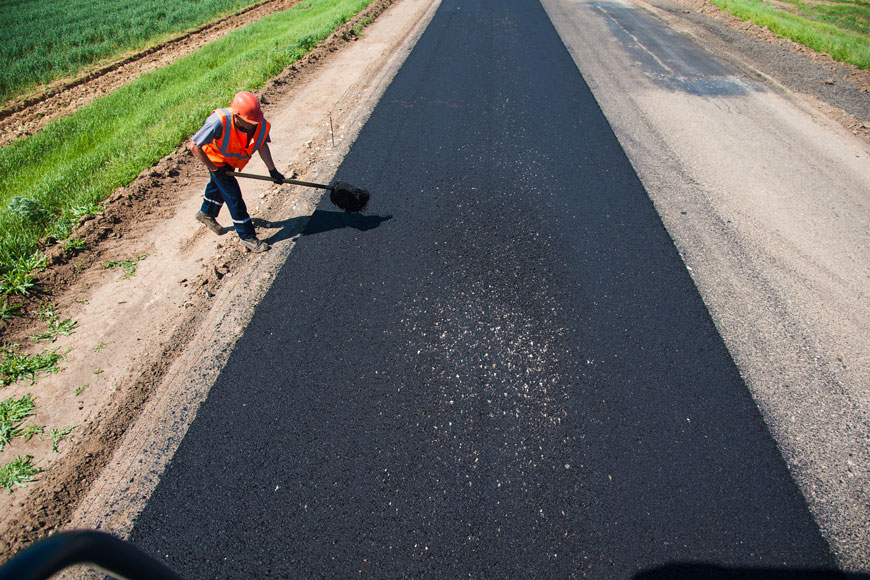Discovering the Environmental Benefits of Warm Mix Asphalt
The use of Warm Mix Asphalt in framework tasks offers a compelling case for lasting development and ecological stewardship. By diving right into the complex details of its manufacturing processes and the ingenious use recycled products, a much deeper understanding emerges of how this modern technology goes past simple surface applications. The environmental benefits of Hot Mix Asphalt prolong far beyond first impacts, supplying a nuanced point of view on how this product can pave the way for a greener future.

Reduced Greenhouse Gas Emissions
The production process of Hot Mix Asphalt includes warming the blend of accumulation and asphalt binder to high temperature levels. By integrating redeemed asphalt sidewalk and recycled asphalt tiles into the mix, the need for virgin materials is lowered, leading to energy financial savings and lowered exhausts associated with extraction and handling.
Research studies have actually revealed that Warm Mix Asphalt sidewalks have a smaller sized carbon impact over their life process contrasted to other pavement alternatives. The resilience and recyclability of Hot Mix Asphalt even more boost its ecological advantages by minimizing the demand for frequent upkeep or replacement, therefore preserving resources and reducing discharges connected with reconstruction activities.
Power Efficiency and Conservation
The production procedure of Hot Mix Asphalt not just reduces greenhouse gas discharges however additionally contributes considerably to power performance and preservation initiatives. Energy effectiveness is an essential benefit of Warm Mix Asphalt manufacturing contrasted to various other pavement kinds. The resilience of Hot Mix Asphalt reduces the regularity of upkeep and reconstruction, leading to long-term energy financial savings.
Sustainable Sidewalk Solutions

One trick aspect of lasting sidewalk remedies is making use of recycled products such as recovered asphalt sidewalk (RAP) and recycled asphalt roof shingles (RAS) By incorporating these materials into the asphalt mixtures, the need for virgin sources is minimized, bring about lower energy usage and greenhouse gas emissions during manufacturing. In addition, the reuse of these products helps divert waste from landfills, adding to a much more sustainable and circular economic situation.
In addition, sustainable sidewalk remedies concentrate on enhancing sidewalk design to enhance efficiency and longevity. Strategies such as cozy mix asphalt (WMA) and stone mastic asphalt (SMA) enhance the longevity and resilience of pavements, minimizing the need for constant repairs and substitutes. By implementing these cutting-edge techniques, framework designers can create sidewalks that not only satisfy high-performance requirements yet additionally lessen their environmental footprint.
Minimized Environmental Effect
Hot mix asphalt, in specific, supplies numerous advantages that add navigate to this site to decreasing the overall environmental impact of roadway facilities. One crucial aspect is the recyclability of asphalt, which can be reused multiple times without jeopardizing its high quality - Regrading.
Moreover, the manufacturing of hot mix asphalt produces lower degrees of greenhouse gases contrasted to other pavement materials, making it an extra ecologically friendly option. The energy performance of asphalt plants has actually additionally improved for many years, resulting in minimized fuel consumption and lower discharges. Additionally, the smooth surface area of warm mix asphalt lowers rolling resistance for automobiles, resulting in lower gas intake and decreased air contamination from automobile exhausts.
Payment to Environment Adjustment Mitigation
Warm mix asphalt plays an important duty in mitigating climate modification through its sustainable residential or commercial properties and minimized ecological influence. One significant payment to environment change reduction comes from the energy performance of warm mix asphalt manufacturing. Compared to other sidewalk choices, the production process for hot mix asphalt eats much less power and releases lower levels of greenhouse gases, therefore minimizing its overall carbon impact.
Moreover, hot mix asphalt's ability to show sunlight, referred to as albedo, assists in lowering urban heat island impacts. By decreasing warmth absorption and retention, hot mix asphalt pavements can reduce the demand for a/c in city locations, subsequently reducing greenhouse gas discharges associated basics with power consumption for cooling down functions.
In addition, the sturdiness and recyclability of warm mix asphalt better boost its environment adjustment mitigation capacities. Regrading. The lengthy lifespan of asphalt sidewalks decreases the requirement for frequent repair services or substitutes, inevitably decreasing the carbon discharges connected to road maintenance activities. The recyclability of asphalt materials reduces the demand for virgin resources and lowers the environmental impact of pavement construction, lining up with sustainable practices for environment modification mitigation.
Final Thought
Finally, the ecological advantages of Warm Mix Asphalt show its significant payment to lowering greenhouse gas discharges, preserving power, and minimizing ecological effect. This my latest blog post lasting pavement service lines up with environment adjustment mitigation initiatives, promotes resource conservation, and enhances facilities growth. By making use of recycled products, energy-efficient production processes, and sturdy layout, Warm Mix Asphalt plays an essential duty in cultivating a much more eco pleasant approach to infrastructure building and construction.
The manufacturing process of Hot Mix Asphalt includes heating the mixture of aggregate and asphalt binder to high temperatures. By integrating recovered asphalt pavement and recycled asphalt tiles right into the mix, the demand for virgin materials is reduced, leading to energy cost savings and decreased emissions linked with extraction and handling.
One trick aspect of lasting sidewalk services is the usage of recycled materials such as recovered asphalt pavement (RAP) and recycled asphalt tiles (RAS) Techniques such as cozy mix asphalt (WMA) and stone mastic asphalt (SMA) improve the sturdiness and resilience of pavements, decreasing the demand for constant repair services and substitutes. Compared to other pavement alternatives, the manufacturing process for hot mix asphalt consumes much less energy and releases reduced degrees of greenhouse gases, therefore reducing its total carbon footprint.